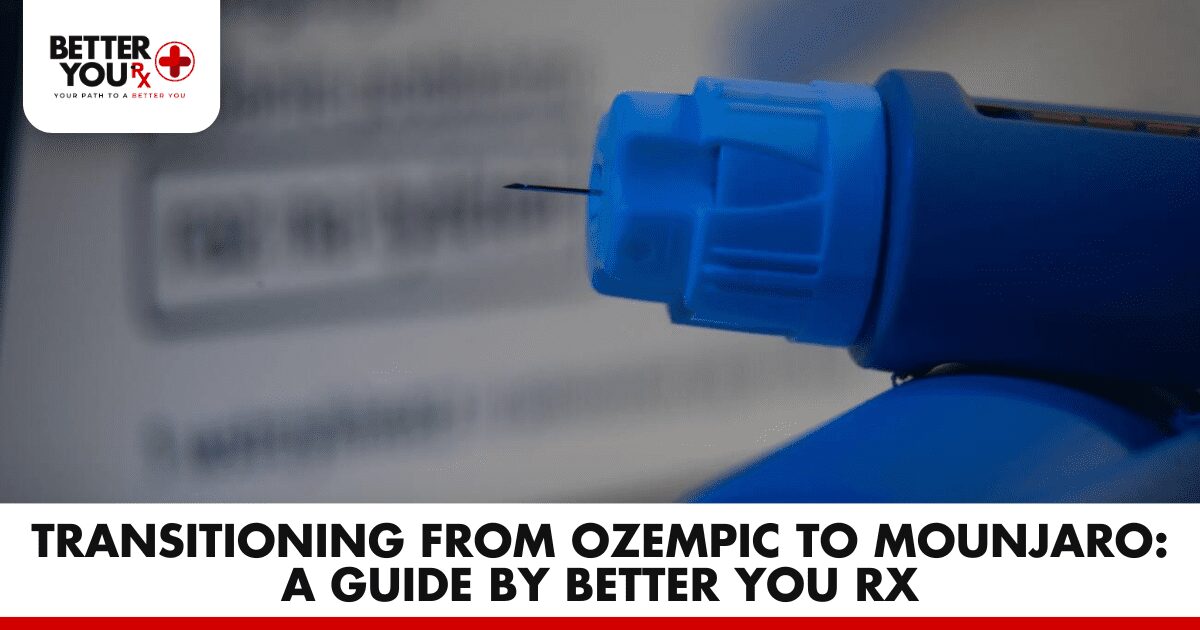In recent years, the landscape of medication for type 2 diabetes and obesity has seen remarkable transformations, offering new hope and options for patients seeking effective management of their conditions. Among these revolutionary medications are Ozempic and Mounjaro, which have gained attention for their effectiveness and potential interchangeability in treatment plans.
Here at Better You RX, we understand the importance of staying informed about the latest in healthcare to help you make better decisions for your health. Let’s dive into the essentials of making a switch from Ozempic to Mounjaro, emphasizing safety, effectiveness, and the nuances of personalized healthcare.
Understanding Ozempic and Mounjaro
What Are Ozempic and Mounjaro?
Ozempic, known generically as semaglutide, and Mounjaro, bearing the generic name tirzepatide, are injectable medications heralded for their effectiveness in managing type 2 diabetes. While primarily approved for this purpose, their benefits extend to aiding weight loss, albeit Ozempic indirectly through off-label use. The distinction lies in their mechanism: Ozempic targets GLP-1 (glucagon-like peptide-1) receptors to enhance insulin secretion, whereas Mounjaro uniquely addresses both GLP-1 and GIP (glucose-dependent insulinotropic polypeptide) receptors, promising a dual-front attack on diabetes and weight management.
The Transition: Is It Advisable?
The increasing instances of patients considering a switch between these medications, spurred by factors ranging from availability to cost, lead to an essential question: Is it safe and effective to switch from Ozempic to Mounjaro?
Experts in the field of medicine and endocrinology affirm that transitioning between these medications is generally safe when done under the guidance of a healthcare provider. The shared goal of these drugs—to foster better management of type 2 diabetes and aid in weight reduction—forms the foundation of this advisability. However, the unique action mechanism of Mounjaro might offer additional benefits, particularly in weight loss, owing to its dual-hormone targeting approach.
Key Considerations When Switching Medications
Dosing and Side Effects
When considering a switch, one of the paramount concerns is the adjustment of dosages to mitigate the risk of side effects, which could range from mild gastrointestinal discomforts to more severe reactions. Transitioning to a higher dose of the new medication might necessitate a gradual process to allow the body to adjust without undue distress. A healthcare provider’s role becomes crucial here, offering personalized dosing strategies to ease the transition.
Insurance Coverage and Accessibility
Another aspect to ponder is the implications of insurance coverage. Given the specific industry standards, the transition might affect the drug’s reimbursement status, particularly if the new medication is used off-label for weight loss. Consulting with your insurance provider can offer clarity and prevent unexpected out-of-pocket expenses.
Lifestyle Adjustments
Transitioning between these medications also underscores the importance of lifestyle choices. A balanced diet and regular exercise not only enhance the effectiveness of these medications but can also alleviate potential side effects. Incorporating healthy lifestyle habits is complementary and integral to maximizing the benefits of your treatment plan.
Making the Switch: Practical Tips
- Consult Your Healthcare Provider: The first and most crucial step is to discuss with your healthcare professional the intention and rationale behind switching medications. They can assess your current health status, review your medical history, and determine the appropriateness of the switch.
- Understand the Medication: Familiarize yourself with the new medication—its dosing specifics, potential side effects, and administration technique. Whether it’s an injectable or oral form, knowing how to take your medication properly is key to its effectiveness.
- Monitor Your Body’s Response: Pay close attention to how your body reacts to the new medication. Any unusual symptoms or side effects should be communicated to your healthcare provider immediately.
- Adopt Healthy Lifestyle Choices: Embrace a balanced diet and regular physical activity to support your medication in managing your condition effectively. Small changes in daily habits can yield significant benefits.
The Bottom Line
At Better You RX, we believe in empowering you with comprehensive knowledge to make informed decisions about your healthcare. Switching from Ozempic to Mounjaro can be a viable option for many, promising an enhanced approach to managing type 2 diabetes and supporting weight loss efforts. However, it’s imperative to undertake this transition under the close supervision of a healthcare professional, ensuring the switch is tailored to your individual needs and circumstances. Remember, the journey to better health is a partnership between you and your healthcare team, with informed choices and proactive management at its core. Embrace the path to a Better You.



